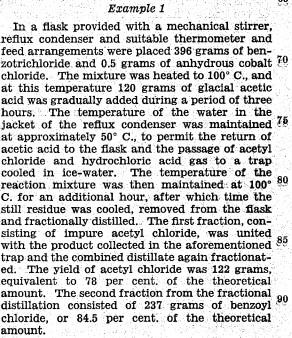| Pages:
1
2
3
4
5 |
Opylation
Hazard to Others
  
Posts: 131
Registered: 30-8-2019
Member Is Offline
|
|
I would like to post one more paper, a parent actually, that describes the preparation on oxalyl chloride via tetrachloroethylene oxalate. I feel like
this could be the holy grail in oxalyl chloride preparation from OTC resources. Unless someone else has a better method.
Attachment: Tetchloret oxalate to Oxalyl Chloride.pdf (442kB)
This file has been downloaded 568 times
|
|
|
clearly_not_atara
International Hazard
    
Posts: 2802
Registered: 3-11-2013
Member Is Offline
Mood: Big
|
|
That patent was already posted here:
https://www.sciencemadness.org/whisper/viewthread.php?tid=82...
Did you read the thread? Please, read the threads. We don't need more repetition, either.
|
|
|
njl
National Hazard
   
Posts: 609
Registered: 26-11-2019
Location: under the sycamore tree
Member Is Offline
Mood: ambivalent
|
|
What if we tried chlorinating glyoxal???
Reflux condenser?? I barely know her!
|
|
|
karlos³
International Hazard
    
Posts: 1520
Registered: 10-1-2011
Location: yes!
Member Is Offline
Mood: oxazolidinic 8)
|
|
Tried to search for that term in this thread?
Because atara said this:
| Quote: |
Did you read the thread? Please, read the threads. We don't need more repetition, either. |
I would second that, but I rather suggest to, maybe, just read the thread instead? 
|
|
|
clearly_not_atara
International Hazard
    
Posts: 2802
Registered: 3-11-2013
Member Is Offline
Mood: Big
|
|
njl was making a joke, I think 
|
|
|
karlos³
International Hazard
    
Posts: 1520
Registered: 10-1-2011
Location: yes!
Member Is Offline
Mood: oxazolidinic 8)
|
|
Damn... I guess I am "angloautistic" then, because I failed to grasp that, and often do so with obvious jokes when they're in english 
|
|
|
Opylation
Hazard to Others
  
Posts: 131
Registered: 30-8-2019
Member Is Offline
|
|
Off topic… removed for irrelevance
[Edited on 10-6-2021 by Opylation]
|
|
|
Praxichys
International Hazard
    
Posts: 1063
Registered: 31-7-2013
Location: Detroit, Michigan, USA
Member Is Offline
Mood: Coprecipitated
|
|
My lab is being moved but there is a lot of promise in (trihalomethyl)arenes like benzotrichloride and 1,3 and 1,4 bis(trichloromethyl)benzene. I did
some research on this years ago during my SOCl2 and acetic anyhdride preps.
Each is easily produced through exhaustive uv photochlorination of toluene or xylene and does not have the side products involved with radical
chlorination of carbonates or esters like methyl formate. A germicidal lamp, quartz flask, and chlorine generator make this pretty trivial albeit
tedious.
These react with carboxylic acids (US 1,921,767 etc) to form acid chlorides and benzoyl chloride.
Where M is the arene:
RCOOH + M(MeCl3) --> RCOCl + M(COCl) + HCl
This happens at 80-140°C with a variety of available catalysts and the oxalyl chloride should continuously distill out.
I saw JJay had this as cursory suggestion further up but nobody followed up on it. I am not able to use my lab right now but I'd venture to guess this
works as long as you're okay with 6+ moles of chlorine for every 1 of oxalyl chloride and a side product of 2 moles of benzoyl chloride. The waste
economy goes up to 1:2 if you can hexachlorinate xylenes but the chlorine usage is the same.
|
|
|
S.C. Wack
bibliomaster
    
Posts: 2419
Registered: 7-5-2004
Location: Cornworld, Central USA
Member Is Offline
Mood: Enhanced
|
|
My guess is that it would not be unwise to use an inexpensive, disposable reactor when heating anhydrous oxalic acid with Ar(CCl3)x, (when x is >1)
and to expect 0.0000% yield of oxalyl chloride.
[Edited on 8-7-2021 by S.C. Wack]
|
|
|
Praxichys
International Hazard
    
Posts: 1063
Registered: 31-7-2013
Location: Detroit, Michigan, USA
Member Is Offline
Mood: Coprecipitated
|
|
Quote: Originally posted by S.C. Wack  | | My guess is that it would not be unwise to use an inexpensive, disposable reactor when heating anhydrous oxalic acid with Ar(CCl3)x, (when x is >1)
and to expect 0.0000% yield of oxalyl chloride. |
Any particular reason for that assessment?

|
|
|
Jenks
Hazard to Others
  
Posts: 163
Registered: 1-12-2019
Member Is Offline
|
|
Am I right in thinking that the difficulty with making oxalyl chloride is that when one end of oxalic acid is made into the acid chloride, the other
half decarboxylates?
|
|
|
S.C. Wack
bibliomaster
    
Posts: 2419
Registered: 7-5-2004
Location: Cornworld, Central USA
Member Is Offline
Mood: Enhanced
|
|
C6H5CCl3 + C2O4H2 = C6H5COCl + 2HCl + CO2 + CO
2C6H5COCl + C2O4H2 = (C6H5CO)2O + 2HCl + CO2 + CO
dates to no later than 1884.
Those able to remember 17 years of history may recall my referring to Roscoe and Schorlemmer...what do they say about oxalyl chloride asks no
one..."From these decompositions it is clear that neither the anhydride nor the chloride of oxalyl can be prepared by the reactions which are employed
for the preparation of the corresponding derivatives of other organic acids." This includes your patent.
BTW acetyl chloride and benzoyl chloride from benzotrichloride was patented in Germany 50 years earlier than that. They too left oxalyl chloride for
others, but did also claim benzyl acetate, acetyl chloride, and ethyl chloride from ethyl acetate. With benzal chloride: ethyl chloride and
benzaldehyde with ethanol, or benzaldehyde, acetyl chloride, and ethyl chloride with ethyl acetate, or benzaldehyde, acetyl chloride, and HCl with
acetic acid. They did claim formic or anhydrous oxalic acid plus benzotrichloride and zinc acetate/chloride...to make benzoic acid. That was figured
out by 1879.
[Edited on 13-7-2021 by S.C. Wack]
|
|
|
RustyShackleford
Hazard to Others
  
Posts: 200
Registered: 10-12-2020
Location: Northern Europe
Member Is Offline
|
|
Quote: Originally posted by Praxichys  | My lab is being moved but there is a lot of promise in (trihalomethyl)arenes like benzotrichloride and 1,3 and 1,4 bis(trichloromethyl)benzene. I did
some research on this years ago during my SOCl2 and acetic anyhdride preps.
Each is easily produced through exhaustive uv photochlorination of toluene or xylene and does not have the side products involved with radical
chlorination of carbonates or esters like methyl formate. A germicidal lamp, quartz flask, and chlorine generator make this pretty trivial albeit
tedious.
These react with carboxylic acids (US 1,921,767 etc) to form acid chlorides and benzoyl chloride.
Where M is the arene:
RCOOH + M(MeCl3) --> RCOCl + M(COCl) + HCl
This happens at 80-140°C with a variety of available catalysts and the oxalyl chloride should continuously distill out.
I saw JJay had this as cursory suggestion further up but nobody followed up on it. I am not able to use my lab right now but I'd venture to guess this
works as long as you're okay with 6+ moles of chlorine for every 1 of oxalyl chloride and a side product of 2 moles of benzoyl chloride. The waste
economy goes up to 1:2 if you can hexachlorinate xylenes but the chlorine usage is the same. |
This apparently does not work with oxalic acid. Relevant sentence from patent US1963749A :
When a side chain polychlorinated product, such as benzotrichloride, is caused to react with dicarboxylic acid such as oxalic acid, benzoyl chloride
and benzoic acid anhydride are formed without the formation of dicarboxylic acid ch10 rides such as oxalyl chloride.
|
|
|
Praxichys
International Hazard
    
Posts: 1063
Registered: 31-7-2013
Location: Detroit, Michigan, USA
Member Is Offline
Mood: Coprecipitated
|
|
Well, beans. Back to the drawing board.
|
|
|
Triflic Acid
Hazard to Others
  
Posts: 486
Registered: 27-9-2020
Member Is Offline
Mood: Slowly Oxidizing into Oblivion
|
|
Wait. Maybe this is too good to be true, but doesn't Atrazine, the pesticide, contain one of the chlorines of the cyanuric chloride?
https://en.wikipedia.org/wiki/Atrazine
Its also easily buyable:
https://www.ebay.com/itm/324527296326?epid=2256058930&ha...
https://www.ebay.com/itm/373597029173?epid=2254546174&ha...
There wasn't a fire, we just had an uncontrolled rapid oxidation event at the power plant.
|
|
|
MaeBorowski
Harmless

Posts: 12
Registered: 8-3-2021
Location: six feet under
Member Is Offline
|
|
And how will this help in the synthesis of oxalyl chloride?
please leave comments about my English in PM
|
|
|
Triflic Acid
Hazard to Others
  
Posts: 486
Registered: 27-9-2020
Member Is Offline
Mood: Slowly Oxidizing into Oblivion
|
|
cyanuric chloride reacts with oxalyl acid to form oxalyl chloride
There wasn't a fire, we just had an uncontrolled rapid oxidation event at the power plant.
|
|
|
clearly_not_atara
International Hazard
    
Posts: 2802
Registered: 3-11-2013
Member Is Offline
Mood: Big
|
|
Unfortunately atrazine is nowhere near as reactive as cyanuric chloride due to the electron density donated to the ring by the amino groups. Compare
trichlorobenzene with 3,5-diaminochlorobenzene, for example.
|
|
|
JJay
International Hazard
    
Posts: 3440
Registered: 15-10-2015
Member Is Offline
|
|
Does it?
https://chemistry.mdma.ch/hiveboard/rhodium/cyanuric.chlorid...
The product here is oxalyl dianilide. If oxalyl chloride is an intermediate, it should be possible to isolate it. I would question whether oxalyl
chloride is ever actually formed or if the reaction proceeds through monochlorinated oxalic acid derivatives.
|
|
|
Triflic Acid
Hazard to Others
  
Posts: 486
Registered: 27-9-2020
Member Is Offline
Mood: Slowly Oxidizing into Oblivion
|
|
So the oxalyl chloride produced reacts with the free amine on the atrazine. Maybe making the dihydrochloride salt would work, ammonium salts are
generally much less reactive.
There wasn't a fire, we just had an uncontrolled rapid oxidation event at the power plant.
|
|
|
JJay
International Hazard
    
Posts: 3440
Registered: 15-10-2015
Member Is Offline
|
|
I haven't had this flask out in a while.

|
|
|
Triflic Acid
Hazard to Others
  
Posts: 486
Registered: 27-9-2020
Member Is Offline
Mood: Slowly Oxidizing into Oblivion
|
|
So?
There wasn't a fire, we just had an uncontrolled rapid oxidation event at the power plant.
|
|
|
garphield
Hazard to Self
 
Posts: 58
Registered: 9-12-2019
Member Is Offline
|
|
https://pubs.acs.org/doi/pdf/10.1021/acs.joc.5b01707
If this works for diacetyl, you'd be able to get oxalyl chloride from just diacetyl + sulfur + chlorine. It may not work, but it could be worth
trying.
|
|
|
clearly_not_atara
International Hazard
    
Posts: 2802
Registered: 3-11-2013
Member Is Offline
Mood: Big
|
|
EDIT: I read garphield's paper about the reaction of S2Cl2 with methyl ketones. The reaction was demonstrated exclusively for
aromatic ketones.
Related to the above, the transesterification of dimethyl oxalate with phenol is well-described elsewhere. The next step is a transesterification of
phenyl esters to thioesters:
https://pubs.rsc.org/en/content/getauthorversionpdf/D1OB0018...
The oxalyl-bis-thioester can then be oxidized to the diacyl chloride with SO2Cl2 analogous to the same reaction with other thioesters. For example:
https://www.sciencedirect.com/science/article/pii/S004040200...
[Edited on 27-6-2022 by clearly_not_atara]
|
|
|
Theoretic
National Hazard
   
Posts: 776
Registered: 17-6-2003
Location: London, the Land of Sun, Summer and Snow
Member Is Offline
Mood: eating the souls of dust mites
|
|
Quote: Originally posted by Opylation  | | I would like to post one more paper, a parent actually, that describes the preparation on oxalyl chloride via tetrachloroethylene oxalate. I feel like
this could be the holy grail in oxalyl chloride preparation from OTC resources. Unless someone else has a better method. |
Having to use oxalic acid ester, or the carbonate which produces phosgene, is not ideal. But other esters work too, acetate is mentioned in the
patent, and I expect the sulfite/sulfate would work too. If SO2Cl2 is used to make the latter, it can also be used as the
chlorine source for photochlorination which avoids using Cl2 gas.
|
|
|
| Pages:
1
2
3
4
5 |